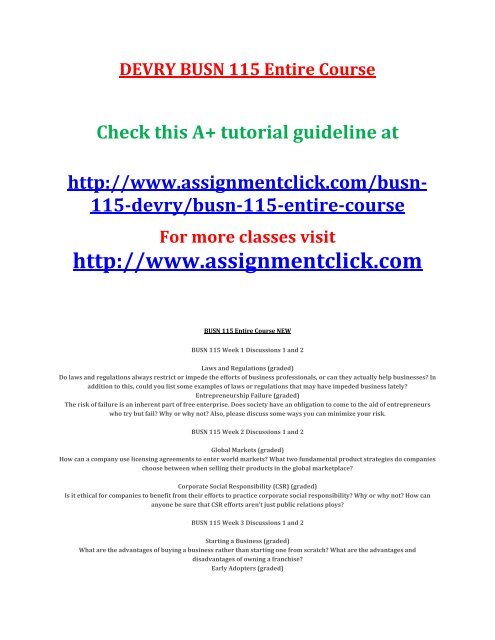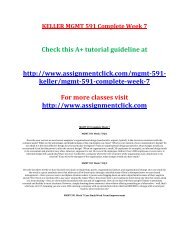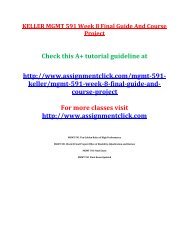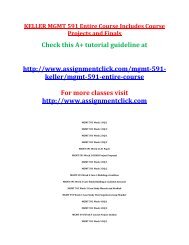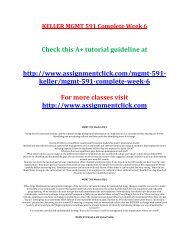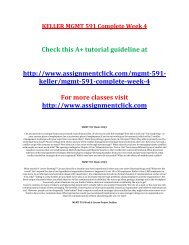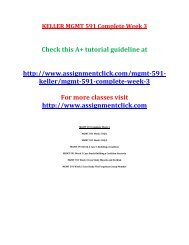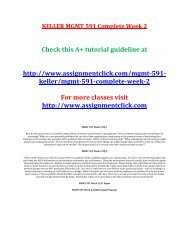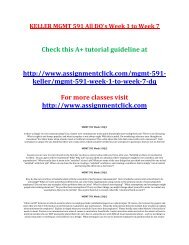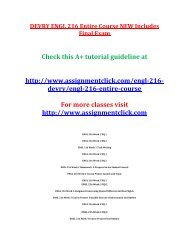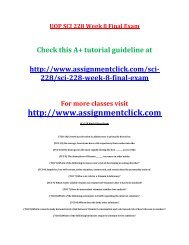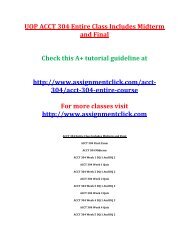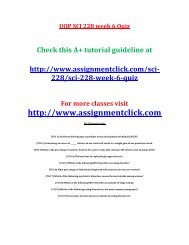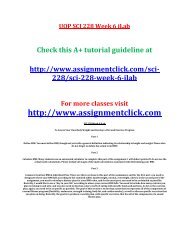DEVRY BUSN 115 Entire Course
busn/115,busn115entirecourse,busn115Devry,Devrybusn/115,busn115assignment,busn115week1,busn115week2,busn115week3,busn115week4,busn115week5,busn115week6,busn115week7,basop115week8,busn115midterm,busn115finalexams
busn/115,busn115entirecourse,busn115Devry,Devrybusn/115,busn115assignment,busn115week1,busn115week2,busn115week3,busn115week4,busn115week5,busn115week6,busn115week7,basop115week8,busn115midterm,busn115finalexams
Create successful ePaper yourself
Turn your PDF publications into a flip-book with our unique Google optimized e-Paper software.
<strong>DEVRY</strong> <strong>BUSN</strong> <strong>115</strong> <strong>Entire</strong> <strong>Course</strong><br />
Check this A+ tutorial guideline at<br />
http://www.assignmentclick.com/busn-<br />
<strong>115</strong>-devry/busn-<strong>115</strong>-entire-course<br />
For more classes visit<br />
http://www.assignmentclick.com<br />
<strong>BUSN</strong> <strong>115</strong> <strong>Entire</strong> <strong>Course</strong> NEW<br />
<strong>BUSN</strong> <strong>115</strong> Week 1 Discussions 1 and 2<br />
Laws and Regulations (graded)<br />
Do laws and regulations always restrict or impede the efforts of business professionals, or can they actually help businesses? In<br />
addition to this, could you list some examples of laws or regulations that may have impeded business lately?<br />
Entrepreneurship Failure (graded)<br />
The risk of failure is an inherent part of free enterprise. Does society have an obligation to come to the aid of entrepreneurs<br />
who try but fail? Why or why not? Also, please discuss some ways you can minimize your risk.<br />
<strong>BUSN</strong> <strong>115</strong> Week 2 Discussions 1 and 2<br />
Global Markets (graded)<br />
How can a company use licensing agreements to enter world markets? What two fundamental product strategies do companies<br />
choose between when selling their products in the global marketplace?<br />
Corporate Social Responsibility (CSR) (graded)<br />
Is it ethical for companies to benefit from their efforts to practice corporate social responsibility? Why or why not? How can<br />
anyone be sure that CSR efforts aren’t just public relations ploys?<br />
<strong>BUSN</strong> <strong>115</strong> Week 3 Discussions 1 and 2<br />
Starting a Business (graded)<br />
What are the advantages of buying a business rather than starting one from scratch? What are the advantages and<br />
disadvantages of owning a franchise?<br />
Early Adopters (graded)
Do you consider yourself an early adopter when it comes to trying out new products or new fashions, or do you tend to take a<br />
wait-and-see attitude? How does your attitude toward new products and new ideas influence your decision making as a<br />
consumer?<br />
<strong>BUSN</strong> <strong>115</strong> Week 4 Discussions 1 and 2<br />
Purchasing Process (graded)<br />
Think of a product you recently purchased and review your decision process. Why did you need or want that product? How did<br />
the product’s marketing influence your purchase decision? How did you investigate the product before making your purchase<br />
decision? Did you experience cognitive dissonance after your decision?<br />
Advertising (graded)<br />
Think about an advertisement (in any medium) that had either a strongly positive or strongly negative effect on your attitude<br />
toward the product being advertised or the advertiser itself. Why did the ad have this effect? If you responded positively to the<br />
ad, do you think you were being manipulated in any way? If you responded negatively—and you are a potential buyer of the<br />
product that was advertised—what changes would you make to the ad to make it more successful?<br />
<strong>BUSN</strong> <strong>115</strong> Week 5 Discussions 1 and 2<br />
Motivation Theories(graded)<br />
Chapter 10 discusses several styles of leadership, including autocratic, democratic, and laissez-faire. How do each of these<br />
styles relate to Theory X and Theory Y assumptions about workers?<br />
Benefit Choices (graded)<br />
When you begin interviewing as you approach graduation, you will need to analyze job offers that include a number of financial<br />
and nonfinancial elements. Which of these aspects of employment are your top three priorities: a good base wage; bonus or<br />
commission opportunities, profit-sharing potential; rapid advancement opportunities; flexible work arrangements; good<br />
healthcare insurance coverage; or a strong retirement program? Which of these elements would you be willing to forego in<br />
order to get your top three?<br />
<strong>BUSN</strong> <strong>115</strong> Week 6 Discussions 1 and 2<br />
Supply-Chain Management (graded)<br />
How can supply-chain management (SCM) help a company establish a competitive advantage? What are ways that companies<br />
can improve their supply chains?<br />
Technology Improvement (graded)<br />
Business is stalled. Sales last month were 10 percent less than the previous month and so far this month is looking even worse<br />
than last month. Could technology help you answer the decrease in sales? What technologies could you deploy to increase<br />
sales?<br />
<strong>BUSN</strong> <strong>115</strong> Week 7 Discussions 1 and 2<br />
Accounting Firm (graded)<br />
The senior partner of an accounting firm is looking for ways to increase the firm’s business. What other services besides<br />
traditional accounting can the firm offer to its clients? What new challenges might this additional work create?<br />
Financial Control (graded)<br />
The company you cofounded last year is growing rapidly and has strong prospects for an IPO in the next year or two. The<br />
additional capital that an IPO could raise would let you hire the brightest people in the industry and continue to innovate with<br />
new product research. There is one potential glitch: You and the rest of the executive team have been so focused on launching<br />
the business that you haven’t paid much attention to financial control. You’ve had plenty of funds from venture capitalists and<br />
early sales, so working capital hasn’t been a problem, but an experienced CEO in your industry recently told you that you’ll<br />
never have a successful IPO unless you clean up the financial side of the house. Your cofounders say they are too busy chasing<br />
great opportunities right now and they want to wait until right before the IPO to hire a seasoned financial executive to put<br />
things in order. What should you do and why?<br />
<strong>BUSN</strong> <strong>115</strong> All Quizzes<br />
<strong>BUSN</strong> <strong>115</strong> Quiz 2
(TCO 1) A(n) _____ is a framework of how a business intends to generate revenue.<br />
strategic management tool<br />
profitability analysis<br />
competitive advantage<br />
entrepreneurial mindset<br />
Instructor Explanation: Chapter 1, page 4<br />
Points Received: 5 of 5<br />
Comments:<br />
Question 2. Question : (TCO 1) All internal and external groups affected by a company’s activities are referred to as its _____.<br />
customers<br />
stakeholders<br />
employees<br />
suppliers<br />
Instructor Explanation: Chapter 1, page 10<br />
Points Received: 5 of 5<br />
Comments:<br />
Question 3. Question : (TCO 1) The _____ function of a business involves the recruiting, hiring, and support of its personnel.<br />
finance<br />
human resources<br />
accounting<br />
information technology<br />
Instructor Explanation: Chapter 1, page 14<br />
Points Received: 5 of 5<br />
Comments:<br />
Question 4. Question : (TCO 1) _____ is defined as having two consecutive quarters of decline in the country’s gross domestic<br />
product.<br />
Stagnation<br />
Immobilism<br />
Stagflation<br />
Recession<br />
Instructor Explanation: Chapter 2, page 36<br />
Points Received: 5 of 5<br />
Comments:<br />
Question 5. Question : (TCO 1) _____ unemployment is the natural movement of workers into and out of jobs, such as when a<br />
person quits one job without first lining up a new job.<br />
Intrinsic<br />
Frictional<br />
Cyclical<br />
Seasonal<br />
Instructor Explanation: Chapter 2, page 37<br />
Points Received: 0 of 5<br />
Comments:<br />
Question 6. Question : (TCO 1) _____ taxes are levied on earnings of individuals to help fund Social Security, Medicare, and<br />
unemployment compensation.<br />
Payroll<br />
Sales<br />
Income<br />
Property<br />
Instructor Explanation: Chapter 2, page 40<br />
Points Received: 5 of 5<br />
Comments:
Question 7. Question : (TCO 1) _____ intelligence involves reasoning, problem solving,<br />
Emotional<br />
Social<br />
Collaborative<br />
Networking<br />
Instructor Explanation: Chapter 7, page 150<br />
Points Received: 5 of 5<br />
Comments:<br />
Question 8. Question : (TCO 1) A(n) _____ is a specific, short-range target or aim.<br />
tactic<br />
strategy<br />
objective<br />
vision<br />
Instructor Explanation: Chapter 7, page 147<br />
Points Received: 5 of 5<br />
Comments:<br />
Question 9. Question : (TCO 1) _____ leaders act as advisors and supporters and generally let subordinates chart and adjust their<br />
own course toward meeting agreed-upon goals and objectives.<br />
Consultative<br />
Autocratic<br />
Transactional<br />
Laissez-faire<br />
Instructor Explanation: Chapter 7, page 151<br />
Points Received: 5 of 5<br />
Comments:<br />
Question 10. Question : (TCO 2) The United States restricts the import of peanuts to a maximum of 1.7 million pounds per year<br />
to protect the price that domestic producers can charge. This is an example of a(n) _____.<br />
Student Answer: import subsidy<br />
embargo<br />
import quota<br />
import tariff<br />
restrictive import standard<br />
Instructor Explanation: Chapter 3, page 53<br />
Points Received: 5 of 5<br />
Comments:<br />
Question 11. Question : (TCO 2) The _____ was established to foster international financial cooperation and its primary functions<br />
include providing short-term loans to countries that are unable to meet their financial obligations and working to alleviate<br />
poverty in developing economies.<br />
World Commerce Center<br />
European Union<br />
North American Free Treaty<br />
International Monetary Fund<br />
Instructor Explanation: Chapter 3, page 54<br />
Points Received: 5 of 5<br />
Comments:<br />
Question 12. Question : (TCO 2) Transparency International is a(n) _____.<br />
watchdog group that works to reduce business-government corruption around the world<br />
agency that works toward implementing protectionist regimes across the globe<br />
agency of the United Nations that is formed to mediate international negotiations<br />
agency of the United Nations that is formed to investigate transparency issues in international trade<br />
Instructor Explanation: Chapter 3, page 59<br />
Points Received: 5 of 5<br />
Comments:
Question 13. Question : (TCO 2) _____ refers to the degree to which information flows freely within an organization, among<br />
managers and employees, and outward to stakeholders.<br />
Whistle-blowing<br />
Transparency<br />
Utilitarianism<br />
Instructor Explanation: Chapter 4, page 71<br />
Question 14. Question : (TCO 2) Which of the following is an example of whistle-blowing?<br />
An employee suggests some process changes to his manager that he claims will increase the productivity of the team.<br />
An employee avoids taking ownership of his mistakes by blaming it on his coworkers.<br />
An employee informs the manager that some of his team members are misusing confidential customer details from the<br />
company database.<br />
An employee who is unsatisfied with his performance appraisal requests his manager for a re-evaluation of his performance.<br />
Instructor Explanation: Chapter 4, page 72<br />
Points Received: 5 of 5<br />
Comments:<br />
Question 15. Question : (TCO 2) Which of the following statements is true regarding ethical decision making?<br />
The disclosure of information by a company insider that exposes unethical behavior by others within the organization is called<br />
an ethical lapse.<br />
Stakeholders’ needs often conflict, requiring managers to make tough decisions about resource allocation.<br />
Making objective decisions will lead to ethical lapses.<br />
When the question of what is right and what is wrong is clear, ethical decisions are easy<br />
to implement.<br />
Instructor Explanation: Chapter 4, page 73<br />
<strong>BUSN</strong> <strong>115</strong> Quiz 4<br />
Question 1 (TCO 3) Which of the following is true about a small business?<br />
A small business is one that is not dominant in its field.<br />
A small firm usually curtails the freedom to innovate.<br />
A small firm avoids risks that larger firms are willing to take.<br />
Instructor Explanation: Page 117<br />
Points Received: 5 of 5<br />
Comments:<br />
Question 2. Question : (TCO 3) Barbara owns a small florist shop that employs a couple of part-time floral designers. She doesn’t<br />
expect her business to grow much, but it provides her with a comfortable income and she enjoys what she does. Barbara’s<br />
business would be described as a<br />
retail business<br />
lifestyle business<br />
high-growth venture<br />
service business<br />
Instructor Explanation: Page 118<br />
Points Received: 5 of 5<br />
Comments:<br />
Question 3. Question : (TCO 3) Three factors contributing to the increased number of small businesses are technologies such as<br />
e-commerce, growing diversity in entrepreneurship, and _____.<br />
increased ease in going public<br />
nationalization<br />
market regulation<br />
monopolistic business practices<br />
Instructor Explanation: Page 120<br />
Points Received: 5 of 5<br />
Comments:
Question 4. Question : (TCO 3) Charles is the purchase agent for a consulting firm. He places orders for office stationeries and<br />
consumables once in two weeks. The purchases are made in large quantities and are billed in the firm’s name. The items that<br />
Charles buys are examples of<br />
expense items<br />
capital items<br />
shopping products<br />
convenience products<br />
Instructor Explanation: Page 317<br />
Points Received: 5 of 5<br />
Comments:<br />
Question 5. Question : (TCO 3) The introductory stage will be followed by a _____ stage for a successful product.<br />
research<br />
saturation<br />
growth<br />
infiltration<br />
Instructor Explanation: Page 318<br />
Points Received: 5 of 5<br />
Comments:<br />
Question 6. Question : (TCO 3) People who monitor social media to spot shifts in consumer tastes are called _____.<br />
trend watchers<br />
crowd pullers<br />
social developers<br />
social programmers<br />
Instructor Explanation: Page 319<br />
Points Received: 5 of 5<br />
Comments:<br />
Question 7. Question : (TCO 4) Consumer purchasing differs from organizational purchasing in that consumer purchasing _____.<br />
follows a formal buying process<br />
has greater complexity in product usage<br />
involves closer relationships between buyers and sellers<br />
has a greater emphasis on economic payback<br />
Instructor Explanation: Page 299<br />
Points Received: 5 of 5<br />
Comments:<br />
Question 8. Question : (TCO 4) The process of examining an organization’s current marketing situation, assessing opportunities<br />
and setting objectives, and then developing a marketing strategy to reach those objectives is called _____.<br />
strategic marketing planning<br />
marketing research<br />
social commerce<br />
marketing concept<br />
Instructor Explanation: Page 301<br />
Points Received: 5 of 5<br />
Comments:<br />
Question 9. Question : (TCO 4) Selling existing products to new markets is called _____.<br />
product development


